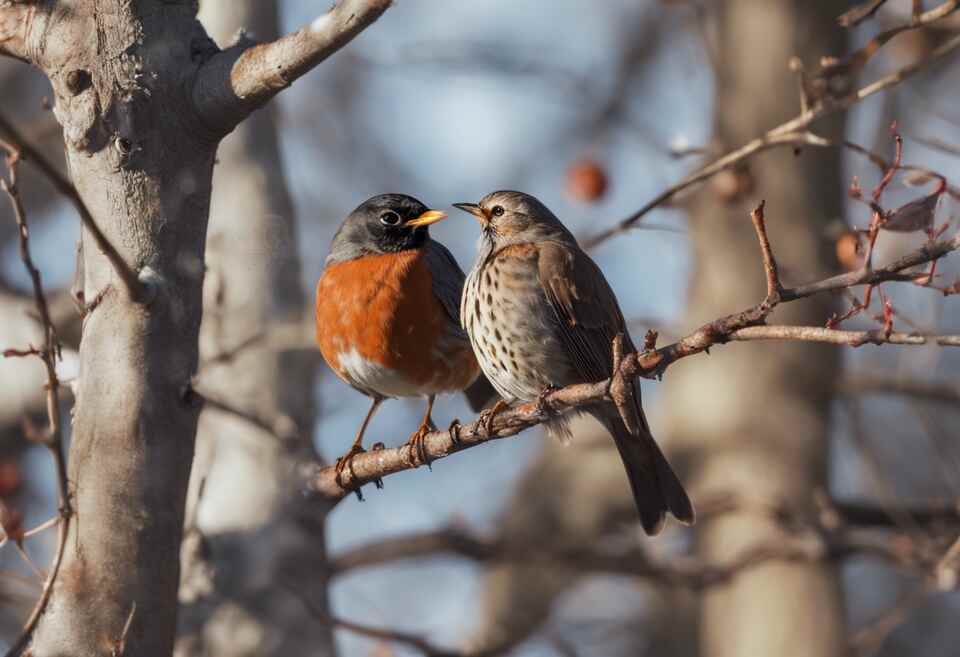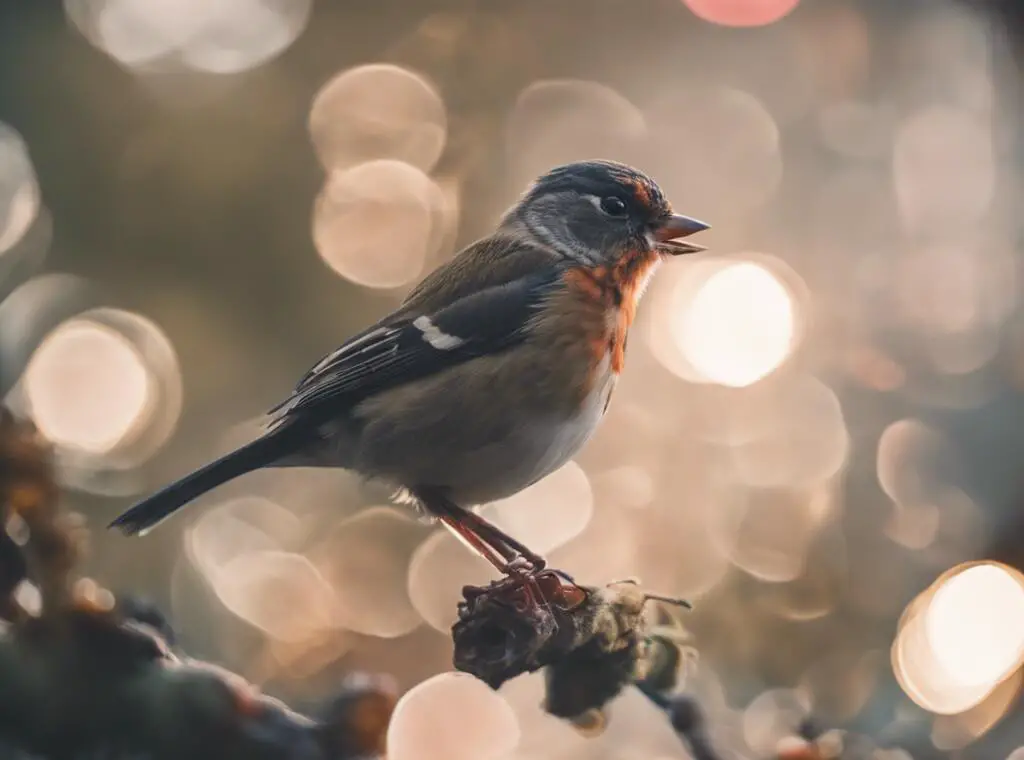The beautiful world of songbirds offers a fascinating glimpse into the diverse avian species present in our environment. These melodious creatures play a vital role in the ecosystem and captivate us with their enchanting songs. Let’s dive deeper into the characteristics and behavior of songbirds to appreciate these feathered wonders even more.
Table of Contents
The Characteristics and Behavior of Songbirds
Understanding Songbirds: A Closer Look
Songbirds belong to the order Passeriformes, which includes more than half of all bird species. These birds are known for their complex vocalizations, with some species capable of mimicking sounds from their environment. Songbirds are found across the globe, inhabiting various ecosystems from lush forests to urban areas.
Physical Characteristics of Songbirds
Songbirds exhibit a wide range of sizes, colors, and markings. They are often characterized by their melodious calls, which are used for communication, mating, and defending territories. Songbirds have specialized vocal organs that allow them to produce intricate songs. Additionally, these birds have strong, agile feet that enable them to perch on branches and forage for food.
Habitat and Distribution
Songbirds can be found in diverse habitats, including forests, grasslands, wetlands, and even urban parks. Each species has specific habitat requirements, depending on factors such as food availability, nesting sites, and predator avoidance. Some songbirds are migratory, traveling great distances between their breeding and wintering grounds.
Feeding Behavior
Songbirds have varied diets that can include seeds, insects, fruits, and nectar. Their feeding behavior is adapted to their diet, with specialized beaks and digestive systems to process different types of food. Many songbirds play a crucial role in controlling insect populations, making them valuable allies for farmers and gardeners.
Reproduction and Nesting
Breeding season sees songbirds engaging in elaborate courtship displays to attract mates. Once a pair forms a bond, they work together to build a nest, incubate eggs, and raise offspring. Songbirds are known for their diverse nest-building techniques, using materials such as twigs, grass, feathers, and mud to construct sturdy nests for their young.
Songbird Conservation
Conservation efforts play a crucial role in protecting songbird populations, as many species are facing threats such as habitat loss, climate change, and predation. By preserving natural habitats, implementing bird-friendly practices, and raising awareness about the importance of songbirds, we can ensure these avian wonders thrive for generations to come.
The Melody of Nature
Songbirds enrich our lives with their enchanting songs and captivating presence. By understanding the characteristics and behavior of songbirds, we can develop a deeper appreciation for these remarkable creatures and strive to safeguard their future. Let’s cherish the melody of nature that songbirds bring to our world.

The Importance of Songbirds in Ecosystems
Songbirds are a vital component of ecosystems around the world, playing a crucial role in maintaining the balance of nature through their unique characteristics and behaviors. These small, colorful birds are not only admired for their melodious songs but also for their significant contributions to the environment. Let’s delve into the importance of songbirds in ecosystems and why they are considered essential for our planet’s biodiversity.
The Role of Songbirds in Pollination
One of the key roles that songbirds play in ecosystems is pollination. While they may not be the primary pollinators like bees or butterflies, some songbird species contribute to the pollination of various plants. As they forage for food, songbirds inadvertently transfer pollen from one flower to another, facilitating the reproduction of plant species. This process is crucial for the production of fruits, seeds, and new plants, ultimately supporting the overall health of ecosystems.
Seed Dispersal by Songbirds
In addition to pollination, songbirds also aid in seed dispersal. After consuming fruits and seeds, songbirds fly to different locations, where they excrete the seeds along with their droppings. This dispersal mechanism helps plants colonize new areas, expand their habitats, and increase genetic diversity. By assisting in seed dispersal, songbirds contribute to the regeneration and growth of vegetation, which is essential for maintaining the biodiversity of ecosystems.
Pest Control and Insect Regulation
Songbirds are natural pest controllers, playing a critical role in regulating insect populations. Many songbird species feed on insects, including caterpillars, beetles, and mosquitoes, helping to keep pest populations in check. By preying on insects, songbirds help prevent outbreaks of damaging pests that can harm crops, forests, and other plant species. This natural form of pest control is not only effective but also sustainable, reducing the need for chemical pesticides in agricultural and natural landscapes.
Indicator Species for Environmental Health
Songbirds are often referred to as indicator species, meaning that changes in their populations can reflect the overall health of an ecosystem. Due to their sensitivity to environmental changes, such as habitat loss, pollution, and climate change, songbirds can serve as early warning signals for ecosystem disturbances. Monitoring songbird populations can provide valuable insights into the state of the environment, helping researchers and conservationists assess the impact of human activities on wildlife and ecosystems.
Conservation Efforts for Songbirds
Given their importance in ecosystems, songbirds have become the focus of various conservation efforts aimed at protecting their habitats and populations. Conservation initiatives include habitat restoration, legislation to safeguard critical habitats, and public awareness campaigns to promote bird-friendly practices. By conserving songbirds and their habitats, we are not only preserving biodiversity but also ensuring the sustainability of ecosystems for future generations to enjoy.
Songbirds play a multifaceted role in ecosystems, from pollination and seed dispersal to pest control and environmental monitoring. By recognizing and appreciating the importance of songbirds, we can work towards conserving these charismatic birds and the diverse ecosystems they inhabit. Next time you hear the enchanting song of a songbird, take a moment to appreciate the vital role they play in maintaining the balance of nature.
Conclusion
Songbirds, with their vibrant colors, melodious songs, and unique behaviors, are fascinating creatures that play a crucial role in ecosystems around the world. Their characteristics and behavior, such as their diverse diets, migratory patterns, and nesting habits, contribute to the rich tapestry of biodiversity in nature. By understanding these winged wonders better, we can appreciate their significance in maintaining the balance of ecosystems and the overall health of the planet.
One of the key aspects that make songbirds so remarkable is the wide range of species that exist within this group. From the tiny hummingbirds to the majestic birds of prey, songbirds come in various shapes and sizes, each adapted to thrive in different environments. This diversity allows them to occupy various niches within ecosystems, fulfilling vital roles such as pollination, seed dispersal, and insect control.
The melodious tunes produced by songbirds serve more than just aesthetic pleasure. Their songs are used for communication, marking territory, attracting mates, and warning of potential dangers. Through their vocalizations, songbirds create a symphony of sounds in forests, grasslands, and wetlands, enriching the auditory experience of nature enthusiasts and researchers alike. The complexity and beauty of their songs reflect the intricate web of relationships that exist within ecosystems.
In addition to their captivating behaviors, songbirds provide essential services that benefit the environment and humans alike. Their role in controlling insect populations helps maintain the balance of delicate ecosystems. By preying on pests such as mosquitoes, beetles, and caterpillars, songbirds help regulate insect numbers, reducing the need for harmful chemical pesticides. This natural form of pest control not only protects crops and gardens but also minimizes the spread of insect-borne diseases.
Moreover, songbirds contribute to the pollination of flowering plants, ensuring the reproduction of numerous species. As they forage for nectar and insects, they inadvertently transfer pollen from one flower to another, facilitating fertilization and seed production. This process is vital for the survival of many plant species and ultimately sustains the diversity of plant life in various habitats.
The presence of songbirds in ecosystems is an indicator of environmental health. Their sensitivity to changes in habitat quality and food availability makes them valuable bioindicators of ecosystem integrity. Declines in songbird populations serve as early warnings of environmental degradation, habitat loss, and pollution. Through monitoring songbird populations, conservationists can assess the overall health of ecosystems and implement measures to protect biodiversity.
Songbirds are not just beautiful creatures that fill our surroundings with music; they are essential players in the intricate symphony of life on Earth. Their characteristics and behaviors reveal the interconnectedness of all living organisms and the delicate balance that sustains ecosystems.
By recognizing the importance of songbirds and taking steps to conserve their habitats, we can ensure a harmonious future where these feathered friends continue to enchant us with their songs and contribute to the health of our planet.



